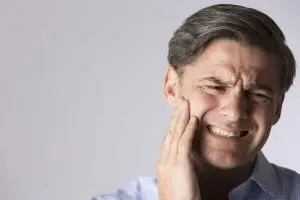A toothache can cause you a significant amount of pain. You may find yourself wondering if you need to visit an emergency dentist in Mesa, or whether you can wait it out until your regular dentist can fit you. There are many reasons why you may be experiencing a toothache. Some of these are emergency situations, while others are not.
Here are the five common reasons you may have a toothache and when you should visit a dentist due to the pain.
Tooth Sensitivity
 One of the reasons you may have a toothache is because you have sensitive teeth. Some people have teeth that are simply more sensitive than other people’s. If you notice that your pain seems to be caused when you are eating or drinking something really cold or really hot, odds are, you have one or more sensitive teeth.
One of the reasons you may have a toothache is because you have sensitive teeth. Some people have teeth that are simply more sensitive than other people’s. If you notice that your pain seems to be caused when you are eating or drinking something really cold or really hot, odds are, you have one or more sensitive teeth.
There are things you can do to help decrease the pain. Avoid eating or drinking these foods. Use a straw to prevent the cold from sitting next to your teeth. Use a toothpaste designed for sensitive teeth. Tooth sensitivity is not a dental emergency, but is something you should mention to your dentist at your next appointment.
Gum Disease
The second common cause of a toothache is gum disease. Many people think that if you have gum disease, or gingivitis, only your gums will hurt. But this is not always the case. It can be hard to tell what exactly is aching in your mouth when you have pain. You may think your tooth is throbbing, when really it is your gums, or vice versa. Additionally, your gums can recede, exposing more of your tooth, which can cause increased sensitivity. Your dentist should check for signs of gum disease at every appointment, but be sure to mention if you have bleeding gums, swollen gums or pain in your gums.
Cracked Tooth
The third common cause of a toothache is a cracked tooth. If your tooth is cracked, the pulp or root of your tooth may come into contact with foods and liquids. This can cause a great deal of pain. If this happens, you will want to make an appointment with an emergency dentist right away. Once an emergency is addressed, follow-up Mesa cracked tooth repair services may be needed to fully restore the affected tooth.
Fixing a cracked tooth right away can help to prevent pain and may be the difference between your tooth being salvageable and your tooth needing to be extracted and replaced. Unfortunately though, you may not always know whether you have a cracked tooth or not. If you are experiencing tooth pain that persists for three to five days, make an appointment to have the tooth looked at and evaluated.
A Cavity
 A cavity, or tooth decay, is another common reason why you may have a toothache. When you have a cavity, you may notice pain when you are chewing, consuming hot or cold foods, or even when you are doing nothing, depending on the location of the cavity and how large it is. Visiting your dentist two times per year is the best way to prevent them.
A cavity, or tooth decay, is another common reason why you may have a toothache. When you have a cavity, you may notice pain when you are chewing, consuming hot or cold foods, or even when you are doing nothing, depending on the location of the cavity and how large it is. Visiting your dentist two times per year is the best way to prevent them.
If you are experiencing dental pain and suspect you have a cavity, there are many home remedies you can use to ease the pain. If the pain is severe and does not subside with home treatments, you will want to make an appointment with an emergency dentist. If you can’t treat the pain at home, make an appointment to be seen with your regular dentist.
An Abscess
The last common reason why you may have a toothache is because you have a dental abscess. This is an infection of your gums or tooth. It can cause severe pain and is a serious condition. If you have any facial swelling, such as your cheek or chin swelling, notice a lump or blister-like growth on your gums, and/or have severe pain accompanied by a fever, you may have a dental abscess. You need to be seen by an emergency dentist right away. They will likely prescribe you antibiotics to treat the infection, while also determining what is causing the infection. They will then proceed to treat the issue, preventing another abscess.
Conclusion
If you are experiencing a dental emergency in Phoenix, Arizona or Mesa, Arizona, Dental Brothers can help you. We have two convenient locations to help treat all of your emergency dental needs. Contact us today to see how quickly we can get you in and begin to treat your dental pain.
